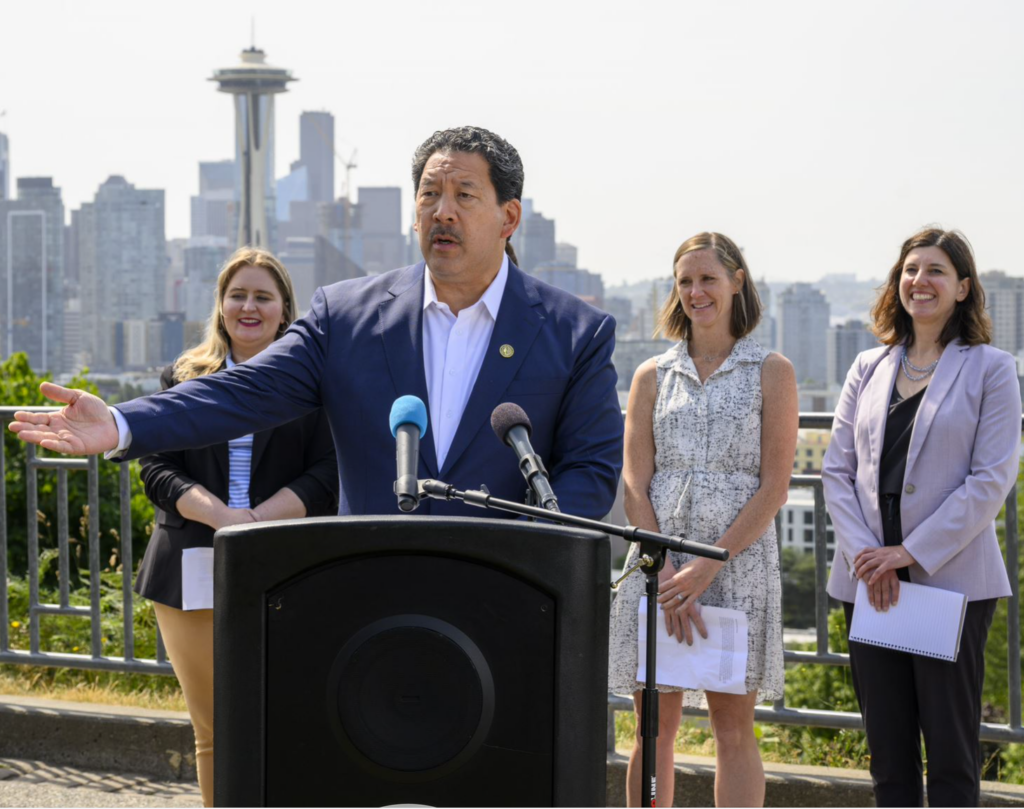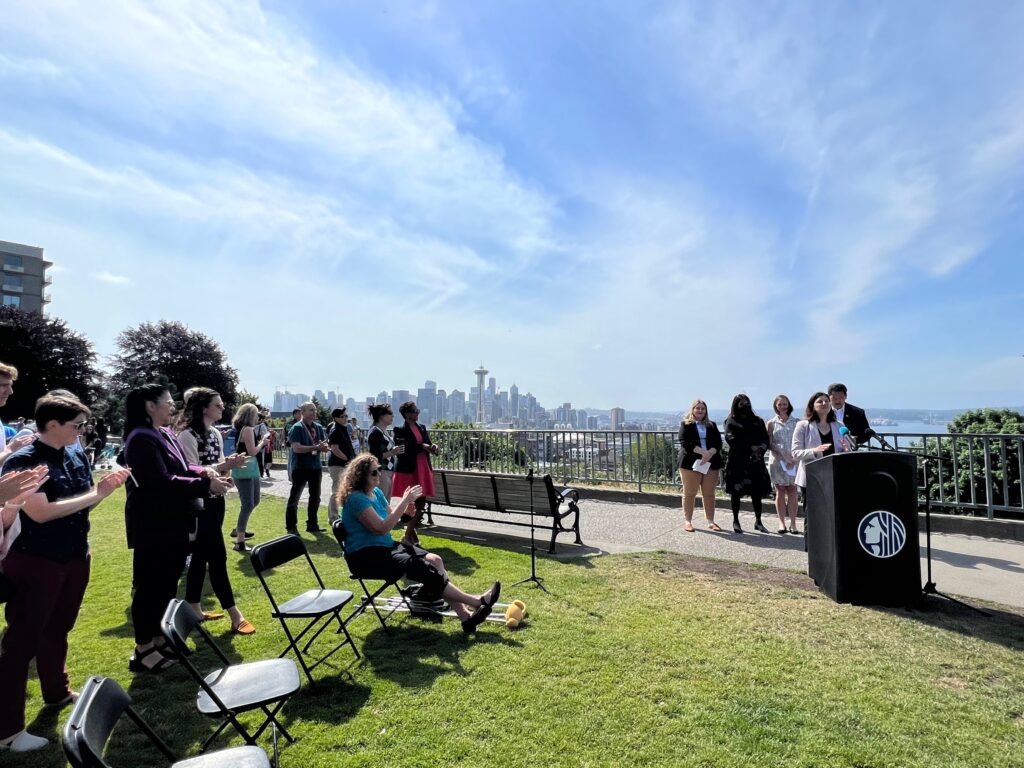Policy continues Seattle’s decades-long legacy of national climate leadership and innovation to meet the urgency and scale of the climate crisis

Seattle – Mayor Bruce Harrell today announced a bold new proposal to reduce emissions for existing large buildings. Applying to existing nonresidential and multifamily buildings greater than 20,000 square feet, the Building Emissions Performance Standard Policy (BEPS) is expected to reduce annual building greenhouse gas emissions by approximately 325,000 metric tons by 2050 – a 27% decrease from a 2008 baseline. The reduction in emissions is the equivalent of taking 72,322 gasoline-powered cars off the road for a year.
“Buildings are one of our largest sources of pollution and must be part of the solution to the climate crisis,” said Mayor Harrell. “This legislation is among the most impactful proposals we can advance to reduce emissions. It will help Seattle decrease energy use and pollution, create new green jobs, and build more resilient communities for extreme heat and smoke events. This proposal was built thoughtfully in collaboration with environmental leaders and activists, climate scientists, workers, building owners, and community members – a wide and diverse array of Seattle neighbors committed to urgent, meaningful action to create clean buildings, a healthy climate, and a sustainable city for generations to come.”
BEPS compliance starts with reporting requirements by 2027 that quantify building emissions and encourage owners to prepare for emissions reductions, followed by requirements to meet emissions targets in five-year intervals starting in 2031. The BEPS policy has flexible compliance pathways to accommodate buildings of many uses, size, type, ownership, age, and systems.
- Path A: Meet standard or portfolio emissions targets at each 5-year interval. Building owners must verify their emissions and meet 5-year targets to be net-zero by 2050.
- Path B: Minor modifications to standard targets. Building owners may receive extensions or exemptions, the ability to deduct emissions from certain end uses or make a compliance payment for the first interval.
- Path C: Special consideration and flexibility due to unique circumstances. Building owners must create a detailed Decarbonization Compliance Plan that outlines their path to net-zero.
“This policy is a critical step forward for addressing harmful greenhouse gas emissions and builds upon decades of Seattle leadership in addressing climate pollution. We heard, loud and clear, from the hundreds of meetings and comments we received that Seattleites want to see action on climate,” said Jessyn Farrell, Director of the Office of Sustainability & Environment. “We are committed to a collaborative and equitable approach that balances the needs and requests of building owners, especially those providing affordable housing, but also recognize we must act now to reduce greenhouse gas emissions immediately. The BEPS policy offers multiple pathways for building owners to comply without sacrificing our urgent work to reduce emissions and advance climate justice.”

The BEPS policy will apply to approximately 1,650 nonresidential buildings, largely downtown and in dense neighborhoods, including high and mid-rise offices, hotels, schools, large warehouses, and retail, and about 1,885 multifamily buildings (typically those with about 20 units or more). About 600 large buildings on campuses like colleges or hospitals are also covered.
“Our larger buildings have the greatest emissions impact per building and will be one of the biggest bites we can take out of emissions from the buildings sector,” said Sandra Mallory, Buildings & Energy Manager at the Office of Sustainability & Environment. “This policy has been several years in the making, and we are excited to put forth this proposal that will cut emissions while maximizing benefits to building owners and tenants and ensuring equitable pathways to high-quality green jobs, especially for people of color and women.”
The City of Seattle received input from hundreds of people during the process of developing the legislation, including residents, workers, community-based organizations, nonprofits, building owners and managers, tenants, labor representatives, environmental justice groups, affordable housing providers, and more, over nearly two years of meetings, open houses, webinars, advisory group and specialized task force sessions.
In addition to this policy proposal, as part of Mayor Harrell’s commitment to clean buildings and healthy air, the City of Seattle is also helping residential homes transition away from heating oil, which is the most polluting form of home heating in Seattle. The City recently reached a milestone of providing more than 1,000 rebates and no-cost upgrades to help low-to-middle income families switch to energy-efficient heat pumps that are powered by clean electricity and that also provide air-conditioning.
Because of these efforts to accelerate heat pump transitions, the City estimates that by 2030 there will be no remaining homes in Seattle heated with oil. Heating oil represents about 8% of total emissions in the buildings sector. Additionally, the Seattle Energy Code ensures that new buildings are constructed efficiently from the start. The Energy Code is updated every three years. In 2021, updates and amendments were signed into law to make Seattle’s 2018 commercial energy code one of the strongest on climate in the nation.
The BEPS policy development was supported by the Bloomberg Philanthropies American Cities Climate Challenge where Seattle joined 25+ cities across the nation in working to advance policies to reduce emissions in the buildings and transportation sectors. From 2019-2021, Seattle received technical analysis, workforce consulting, stakeholder outreach assistance, and capacity building support.
For more information about the proposed BEPS policy, see the full BEPS legislation.
What People Are Saying:
“Buildings are currently the fastest-growing source of greenhouse gas emissions in Washington, and burning fossil fuels inside our homes and buildings pollutes our indoor air and harms public health. Following successes across the state to ensure new buildings are built clean, Seattle’s new Building Emissions Performance Standard will ensure Seattle’s existing buildings transition to being fully powered by clean energy over the next few decades. By shifting homes and buildings off fossil fuels, this policy will help put Seattle on track to meeting its climate targets while also protecting the health of our communities, reducing air pollution, and increasing the use of heat pumps that provide both heating and air conditioning.”
Kelly Hall, Washington State Director, Climate Solutions
“Affordable housing is critical, as is solving our ever-growing climate crisis. Today, through Mayor Harrell’s leadership, we will start making meaningful reductions in the climate pollution that, sadly, impacts our most vulnerable communities in Seattle first and worst. We will, at the same time, ensure that we are creating more resilient housing for Seattle’s residents far into the future. This is one of those rare moments when we can celebrate a giant policy leap forward that addresses the intersecting crises of affordable housing, racial equity, and climate change. I am proud of the work we did together to ensure that the Building Emissions Performance Standard works for affordable housing providers and the broader ecosystem.”
Patience Malaba, Executive Director, Housing Development Consortium
“Climate change has reached Seattle in the form of wildfire smoke and heatwaves, and this policy is part of the solution. Mayor Harrell’s Building Performance Standards policy is forecasted to create thousands of jobs over its lifespan, which will benefit Seattle-area workers and expand career pathways for women and workers of color.”
Katie Garrow, Executive Secretary-Treasurer, MLK Labor (AFL-CIO)
“Buildings must be part of the climate solution and Seattle’s Building Emissions Performance Standards is a key strategy, guiding the city’s largest buildings on a path to clean, efficient electric systems as they upgrade over the coming years. The resulting clean energy retrofits will make a difference in day-to-day lives, by expanding access to heat pumps for cooling in the face of heat events and wildfire smoke that are now familiar in our region.”
Rachel Koller, Managing Director, Shift Zero
“This proposed Building Performance Standard is vital to helping Seattle achieve its climate, clean energy, and economic goals. Building retrofits require planning and investment, and this proposal provides both. Large commercial and multifamily building owners will be able to access funding and incentives for clean energy retrofits from the Federal Inflation Reduction Act, and state and local programs to decarbonize their buildings in the coming years, creating healthier living and working spaces.”
Nancy Hirsh, Executive Director, NW Energy Coalition
“To protect public health and mitigate the worst impacts of the climate crisis, Seattle must transition off of fossil fuels like polluting fracked gas. Developing strong and enforceable Building Emissions Performance Standards and requiring large buildings to make the switch from dirty fuels is a critical step to protect our climate and reduce indoor and outdoor air pollution, and will offer a model for other cities in the region to follow.”
Dylan Plummer, Senior Campaign Representative, Sierra Club
“The proposed Seattle Building Emissions Performance Standard positions the city among national leaders in reducing emissions from existing buildings—a crucial step to confronting the climate crisis and delivering health and economic benefits for families and businesses. RMI applauds Mayor Harrell for proposing this new standard and we look forward to supporting a strong policy that prioritizes housing equity, climate justice, and energy savings for its most vulnerable residents.”
Jonny Kocher, Senior Associate, Carbon-Free Buildings Program, RMI
“Fossil fuel use in buildings is one of the biggest contributors to the pollution that causes climate change. Seattle has helped to lead the way in Washington on reducing pollution in new construction and we’re encouraged to see them moving forward with a proposal to reduce pollution from existing buildings. This is a step in the right direction, and we hope this policy can help accelerate related efforts. A win in Seattle sets a template for cities across the country to do the same.”
Michelle Piñon, SAFE Cities Senior Organizer, STAND.earth
“We applaud Seattle’s proposed BEPS policy and its decision to join the ranks of major US cities leading the charge on building energy performance standards. With this move, Seattle not only aligns itself with cities like Boston, St. Louis, New York, and Washington, DC, but also positions itself favorably to secure vital federal funding for equitable implementation. The proposed BEPS is a win-win-win, benefiting buildings, residents and the climate. We are proud to have partnered with the City of Seattle on the development of this policy. “
Jessica Miller, Senior Director of Policy Strategy & Engagement, IMT
“Developing the Building Emissions Performance Standard was a key outcome of Bloomberg Philanthropies’ partnership with Seattle through the American Cities Climate Challenge. Today’s announcement underscores Seattle’s continued leadership on climate and the immense potential for all cities to accelerate climate action that benefits their communities, economy, and environment.”
Antha Williams, Bloomberg Philanthropies’ Environment Program Leader
“This is important and challenging legislation. As a member of the Technical Advisory Group, it feels like our concerns were heard and addressed. The City did a great job of listening to stakeholders and crafting a standard that is simple to understand and will be effective at reducing greenhouse gas emissions from buildings.”
Neil Bavins, Principal, Windward Consulting NW